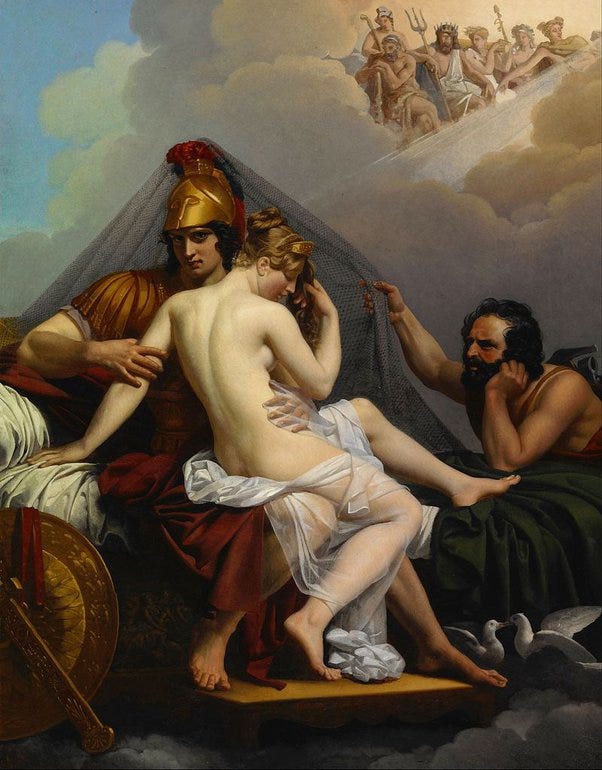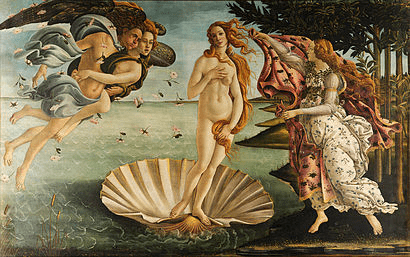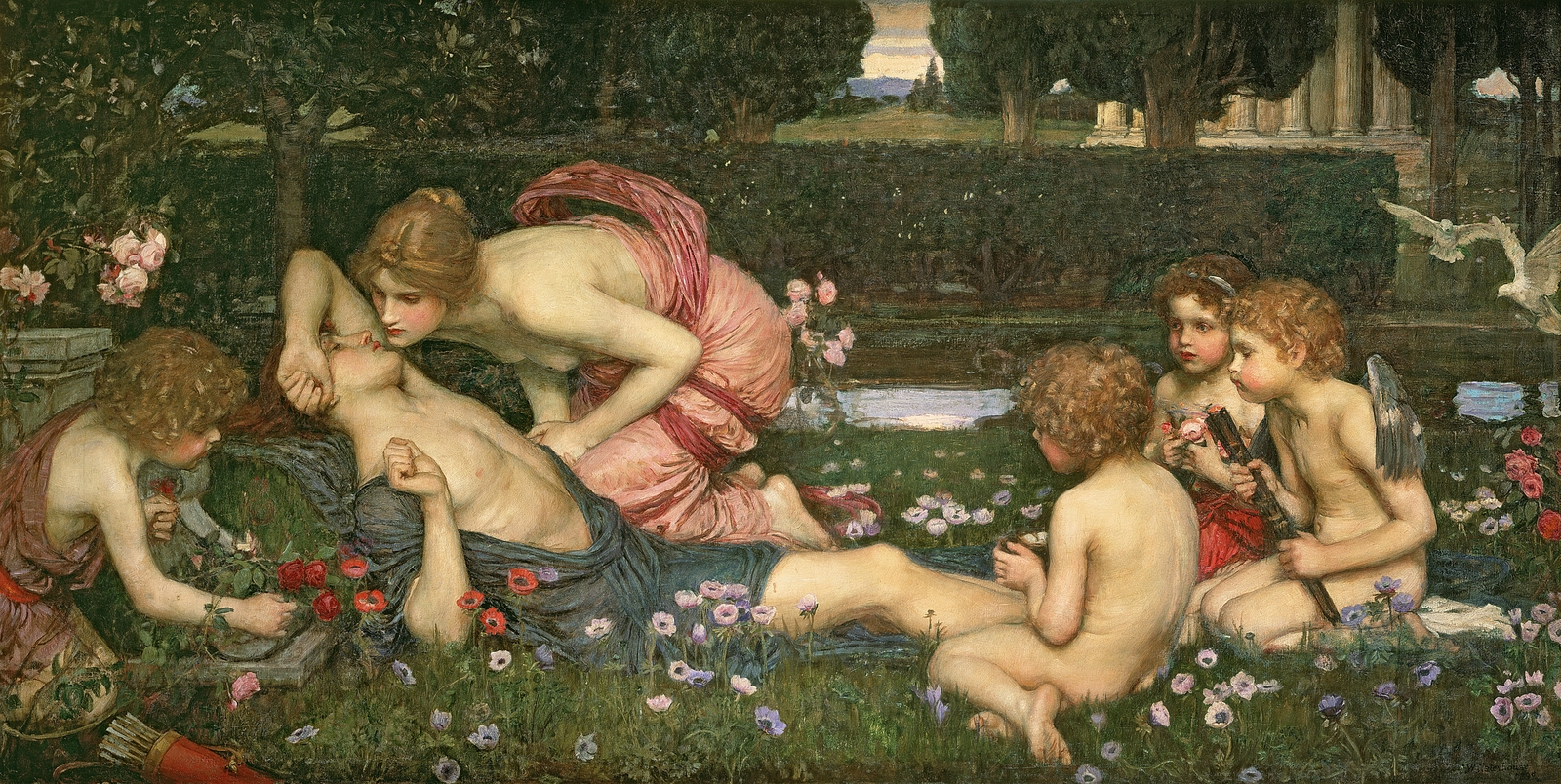The Birth of Venus
Aphrodite: The Alchemical Goddess of Love and Beauty

Aphrodite is in a class of her own, as she had a magical quality, and the ability to transform people. Aphrodite is the alchemical goddess, because she alone had magical powers of transformation that could cause both gods and mortals to do as she bid them. She cast spells which resulted in mortals and deities falling in love, and conceiving new life. She turned a statue into a living woman for Pygmalion. She inspired poetry and declarations of love, symbolizing her creativity in using the power of love.
She has traits in common with other goddesses of greek mythology, but does not belong in any group, thus stands alone. Aphrodite was the most sexually active goddess, so she cannot be grouped with the virgin goddesses, Artemis, Athena or Hestia. The only way she is like them is that she does what she wants, when she wants, and lives to satisfy her own pleasures.
Aphrodite also does not fit the profile of a vulnerable goddess, such as Hera, Demeter, or Persephone, as she was never victimized by a man or made to suffer because of one. The feelings and desires were mutual in any relationship Aphrodite entered into, and she valued independence from others (which was not a trait of the virgin goddesses), and she was not looking to get into a permanent situation with any one man (a characteristic of the vulnerable goddesses).
Aphrodite loves relationships and they are important to her, but she does not want to make any long term plans. She wants to consummate relationships and create new life. This archetype can be expressed through sex, or through an artistic or creative project. Aphrodite is able to focus on what is meaningful to her, it is impossible for anyone to sway her from a goal once she has decided upon it. Oddly, she has the most in common with Hestia, the introverted and most anonymous virgin goddess, although Hestia quietly did whatever she wanted as well, she just did not have such a strong connection or desire for men.
Aphrodite is Irresistible to Men!
Whenever Aphrodite imbues something or someone with beauty, it immediately becomes irresistible, and a magnetic attraction occurs. We often call this “chemistry” between people. It is a powerful urge to get closer to someone, to have sex, yet also represents a psychological and spiritual urge as well. It can be an intense conversation where you just “click” with the other person.
Aphrodite generates the desire to know and be known. If this leads to intimacy, impregnation and new life may follow. If this union is of the mind, spirit or heart, new growth occurs in the psychological, spiritual, or emotional spheres. Her effect is not limited to the sexual and romantic. Aphrodite feels platonic love, deep friendships, empathic understandings, and soul connections. When growth is generated, or a vision is supported, or a spark of creativity is encouraged, Aphrodite is influencing it, affecting the people involved.
Aphrodite has very focused attention, and is both receptive and attentive to people. She is always in the limelight, and makes others feel special when she turns her charm their way. The issue here is that Aphrodite acts as if everyone she interacts with is special and fascinating, and it is easy to misinterpret her intentions. While people bask in her glow, they feel important and special. She draws them out, and acts in an affirming and loving way, rather than being assessing or critical. She lives in the moment, and this can be very seductive for anyone to experience. But it misleads people into thinking she is enamored of them, when she is not. This is just her normal way of behaving with anyone.
Many of the gods were in love with Aphrodite because of her beauty and vied for her attentions. Aphrodite was linked romantically with Ares, god of War, and had a long term affair and several children with him. They had a daughter, named Harmonia, and two sons, Phobos and Deimos. Aphrodite and Ares represent the union of two uncontrollable passions, and when in balance (which was often not the case) they were able to produce Harmony.
The child of Aphrodite’s union with Hermes, the Messenger of the gods and Guider of souls to the Underworld, was the bisexual god Hermaphroditus, who inherited the beauty of both parents, and had the sexual characteristics of both. Hermaphroditus can represent either bisexuality or androgyny, the existence of qualities traditionally considered either masculine or feminine.
In some accounts, she has a son called Eros, god of Love. But in some stories Eros is seen as a god who accompanied Aphrodite as she emerged from the sea and was born. Later myths describe him as a fatherless son of hers. The Greeks normally portrayed Eros as a virile and attractive young man, and so did the Romans, though they called him Amor. As years went on, the role of Eros became diminished, and today he is only known as the diapered baby with arrows that we call Cupid.
Aphrodite and her Exploits with Mortals
Aphrodite also had relations with mortal men. She was desirous of Anchises when she saw him grazing his cattle on a mountainside. She acted the part of a beautiful maiden and seduced him. When he later fell asleep, she took off her disguise and revealed herself to Anchises, telling him she would bear their son, Aeneas, and asked him not to tell anyone she was the mother. Apparently Anchises drank too much and boasted of his affair with Aphrodite, so she had him struck with lightening and crippled.
Aphrodite was also attracted to Adonis, a handsome and youthful hunter. She was afraid for his life and warned him away from ferocious beasts, but the thrill of the hunt,and his fearless attitude ruled his actions. One day Adonis flushed out a wild boar, and wounded it with his spear. The boar was in such intense pain that he savagely ripped Adonis to shreds. Adonis died, but was allowed to leave the Underworld for part of the year to see Aphrodite, although she had to share him with Persephone, when she was in her period in the Underworld. The annual return of Adonis to Aphrodite symbolized the return of fertility.
Women were also powerfully affected by Aphrodite’s charms, and everyone was compelled to follow what Aphrodite dictated. Myrrha was the daughter of a priest, who fell passionately in love with her father. Aphrodite caused this forbidden passion to happen because Myrrha’s mother bragged that Myrrha’s beauty was greater than Aphrodite’s. Aphrodite caused Myrrha to be disguised and during this she had sex with her father several times. When he realized this seductive woman was his own daughter, he was overcome with disgust and horror. He was about to kill her, but then Myrrha prayed to the gods to save her, and she was transformed into a fragrant myrrh tree.
Aphrodite’s Mean Streak and Cruelty to Others
Phaedra was another victim of Aphrodite’s power. She was the stepmother of Hippolytus, a handsome man who had dedicated himself to Artemis, and a celibate life. Aphrodite was insulted when Hippolytus ignored her overtures, so used Phaedra against him. She caused Phaedra to fall hopelessly in love with her stepson, although Phaedra tried so hard to resist her attraction to him that it made her sick. Her handmaiden realized what was happening, and told Hippolytus what Aphrodite had done. He was infuriated that anyone would suggest that he would have an affair with his stepmother and said some very unflattering things about Phaedra while she was within earshot.
Poor Phaedra was so humiliated that she hanged herself, leaving a suicide note saying Hippolytus raped her. When his father returned to see his dead wife and the note, he called on Poseidon to kill his son. Poseidon caused huge waves and a sea monster to frighten Hippolytus’ horses, who were so frightened; they ended up dragging Hippolytus to his death. There are many more stories about Aphrodite’s vengeful and cruel acts to other people that are just as shocking, so apparently her beauty was only skin deep. In our times she would most likely be slut shamed. And a mean spirited one at that.
Aphrodite’s Task’s for Daughter in law Psyche
Are You Good Enough for Your Mother-in-Law?

Psyche was a pregnant, mortal woman, who wanted to be reunited with her husband Eros, Aphrodite’s son. To test her, to decide if Psyche is worthy of her son, Aphrodite gave Psyche what seemed like four impossible tasks to complete. First she lead Psyche to a giant pile of seeds jumbled together, and told her she must sort them. An army of ants came to Psyche’s aid. So the first lesson is that a woman must make a decision, and “sort the seeds”, to see what is the most important situation to be attended to when we have conflicted feelings, and what less urgent matters can wait for attention later. It is imperative not to act on something until clarity has been achieved.
Next Aphrodite ordered Psyche to acquire a golden fleece from terrible, horned rams. Again, this seemed impossible. A green reed advised Psyche to wait until the sun went down, because the rams would quiet down and go to sleep. Once this happened, Psyche would be able to safely pick the golden fleece from the brambles on which it hung. The golden fleece is a symbol of power, which a woman needs to acquire so that the world does not destroy her. It is important to be able to learn to use power wisely, by waiting, observing, and acquiring it slowly and indirectly. Remember that Aphrodite herself often used her powers in a destructive way that hurt others. Power in itself is neutral.
Psyche’s Tasks from Aphrodite, Greek Goddess of Love and Beauty
The third task was for Psyche to fill a crystal flask from a stream that ran from up in the clouds to under the earth. It cascaded from the summit of the highest cliff, and then ran to the lowest depth of the Underworld, before it was once more drawn up through the earth. The stream was a metaphor for the circle of life. An eagle came to Psyche, because he had the ability to see the land from a large perspective, then swooped down to grasp whatever was necessary. Sometimes it is difficult for a woman to take the long view or see the “whole picture”, when she has so many people and problems vying for her attention. Women must learn to get some emotional distance from problems, or else sometimes they cannot see the forest for the trees. They must learn to figure out what is most significant and important, and only then decide how to act upon the issues.
The fourth task sent Psyche to the Underworld with a small, empty box that needed to be filled with beauty ointments from Persephone. Psyche was frightened, as she felt this task is the one that meant death for her. This is the hero’s test, where the most determination and courage are needed. Aphrodite knew she was making it especially hard for Psyche. She told Psyche that pathetic and poor people would ask her for help as she was trying to complete this task. But she would have to ignore them, to “harden her heart” to compassion, and continue onward. If she failed, Psyche would have to stay forever in the Underworld.
To say “no” is a particularly hard task for women, as they are used to being receptive to others. Many women, including this writer, allow themselves to be imposed upon and diverted from accomplishing whatever goal is important to them at the time. Even if the person who “needs” help only wants some company or comfort, a woman must say no if it takes her away from doing something that is necessary and important to herself and her own well-being. Psyche must exercise choice every time she says “no.” She completed this task too, and evolved. So although it seems that these tasks are just another case of Aphrodite being cruel, she actually taught Psyche valuable lessons, ones that all women can use to simplify their lives and achieve their goals.
Aphrodite
Aphrodite’s Love of Beauty and Sexuality
The Aphrodite archetype in mythology affects women’s enjoyment of love, beauty, sexuality and sensuality. They feel a desire to fulfill both creative and procreative functions while feeling this powerful pull. Aphrodite has children because of her desire for the man, and her desire for the romantic experience. She is a great force for change. When an artist or writer stays up all night for weeks to work on a painting or write a book, the creative result is still a union that gives birth, but to a creative work of some kind.
Aphrodite came out of the sea in all her naked, golden haired beauty. But she can also be part of a plain looking woman, who is charismatic and attracts others with her warmth and charm. If she works, she is best suited to a career in the arts, such as music, dancing or drama. She is most concerned with being happy in work, not in how much money she can earn. Unless Aphrodite has strong Hera instincts, she will not want to be chained to a marriage.
She does like children though, and they respond to her well. She makes children feel special, and can really get into the spirit of play and make believe. An Aphrodite woman often has many female friends who enjoy her spontaneity and attractiveness. Many of them share the same qualities. Other women that surround her seem to act more as her attendants, because they either enjoy her company or like to live vicariously through her romantic dramas. She will have no friends of the “Hera” variety, as she will be mistrusted by a woman who is afraid that her man will be stolen away from her. An Aphrodite has a long history of “stealing” her supposed friend’s boyfriends and husbands, ruining relationships, and then casting the men aside once the damage is done.
The middle aged years will be hard for Aphrodite if her attractiveness has been her biggest source of security. She will feel anxious that her beauty is fading. But she may also be tired of her former lifestyle and get an urge to settle down. If she has been engaged in creative work, her enthusiasm and abilities to find inspiration may grow and she may develop even more skills with which to express herself. As she grows old, she can keep her capacity to see beauty in whatever or whomever she focuses on.
This will enable her to grow older with grace and vitality. She will retain a youthful attitude towards life, and staying young at heart will continue to win her new friends of all ages. After all, Aphrodite women are extroverts with a lust for life and a passionate personality, and this does not have to fade with age. If she developed her skills and became educated, Artemis and Athena traits will become more prominent in her now, as she finds new interests to occupy her and her life centers less around men. If she marries and has a child, Hera and Demeter influences will have given her more family stability and maturity. If she cultivates some of Persephone’s introversion, she can have a rich fantasy life instead of being a heart breaker and home wrecker.
Our Inner Aphrodite
As women we all need to develop capabilities and strengths as our courage and determination are tested. Despite all the problems we encounter, and trials we endure, each one proves to us that we are much more capable and stronger than we ever believed. There is an old saying, “Whatever doesn’t kill you makes you stronger.” All people value love and will risk almost anything for it. We must be sure we wisely choose whom we love, and then we will be winners, because our relationships will have value, and we in turn will be valued and respected in them. So although we may not wish to emulate all of Aphrodite’s traits, by learning her story we can see parts of our own selves, and learn something unique not only from her, but from each of the goddesses in Greek mythology. Pay attention to the inner goddess in yourself!





